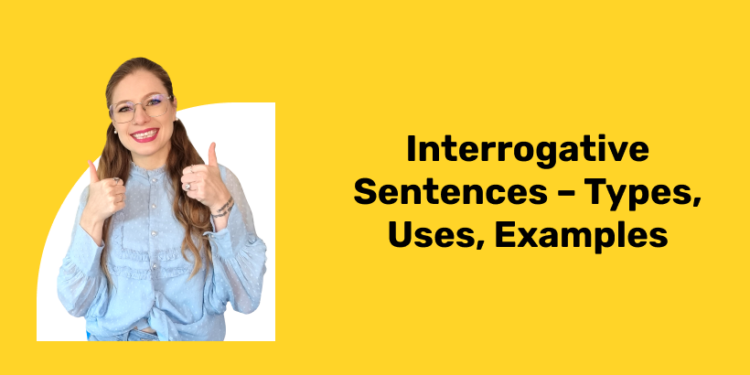Table of Contents
An interrogative sentence asks a direct question and is punctuated at the end with a question mark. It is one of the four basic types of sentences, and it’s a highly useful one.
Interrogative sentences allow you to gather information and clear up confusion as well as engage in interesting conversations with others. It’s also useful in writing as an organizational tool; for example, you can set up questions as headers and answer them to explain a concept in more detail in expository writing.
Start speaking English like a native with our comprehensive course.
What is an Interrogative Sentence?
An interrogative sentence is a sentence that asks a question. Interrogative sentences can be direct or indirect, begin with or without pronouns, and feature yes/no interrogatives, alternative questions, or tag questions. Interrogative sentences often start with interrogative pronouns and end with a question mark. Interrogative pronouns, typically “wh” words, include “who,” “what,” “when,” “where,” “why,” “which,” “whose,” and “whom.”
Join our Spoken English program today and communicate with ease!
Interrogative Sentence Examples:
- What is your name?
- Did you complete your homework?
How can I Form an Interrogative Sentence?
1: Which of the sentences below is grammatically correct?
Forming interrogatives will likely come to you quite naturally. However, it is always good to understand exactly how we form different types of interrogative.
Here is the basic form (structure) of an interrogative sentence:
| auxiliary verb | + | subject | + | main verb | ||
| Do | you | Like | coffee? | |||
| Can | she | speak | Japanese? | |||
| Do | you | want | Pizza | or pasta? |
When using WH question words, they always go at the beginning of the sentence, like this:
| WH word | auxiliary verb | + | subject | + | main verb |
| What | does | she | Like? | ||
| Where | is | the exit? |
The basic structure of a tag question is:
| Positive statement | Negative tag |
| Adele is great, | isn’t she? |
| Negative statement | Positive tag |
| You don’t want ice, | do you? |
Spoken English Course for Guaranteed Confidence and Career Growth
Spoken English Course by Entri App: Enhance your communication skills, gain certification, and boost your career with confidence.
Join Now!Uses of Interrogative Sentence
Though the basic purpose of an interrogative sentence is to ask a question, there is a lot more that interrogative sentences can do. Given below are the uses or rather functions of interrogative sentences.
- To ask a direct question
- To request clarification
- To confirm something
- To gather information
What is the Function of an Interrogative Sentence?
The basic function (job) of an interrogative sentence is to ask a direct question. It asks us something or requests information (as opposed to a statement which tells us something or gives information). Interrogative sentences require an answer. Look at these examples:
- Is snow white? (answer → Yes.)
- Why did John arrive late? (answer → Because the traffic was bad.)
- Have any people actually met an alien? (answer → I don’t know.)
Start speaking English like a native with our comprehensive course.
10 Interrogative Sentences
Throughout our life, we constantly question things, and therefore we have many questions in our minds. In order to learn new information, to eliminate confusion and clarify a subject we are curious about, we construct questioning sentences. An interrogative sentence contains a direct question and a interrogation mark is put at the end of the sentence.
As with other sentences in English, it should include subject and verb in interrogative sentences, and the word order is often changed to put the verb in front of the subject.
10 Interrogative Sentences;
- When will you visit your moms?
- Where do you live?
- Why haven’t you started studying?
- What kind of music do you want to dance to?
- Which car would make you happier?
- Which do you prefer, white or red?
- Who finished your meal today, raise your hands?
- Whom did you call to the party tomorrow?
- Whose is this red big notebook?
- Whose pants are these?
Basic Grammar Topics for Spoken English – Download PDF
What is a Negative Interrogative Sentence?
A negative interrogative is a question that has been made negative by adding the word ‘not‘. The word ‘not‘ is often contracted with an auxiliary verb. For example, don’t, aren’t, isn’t, and haven’t. We usually use negative interrogatives when we expect a specific answer or want to emphasize a point. Let’s take a look at some examples.
- Where haven’t you looked?
Here, a direct question is being asked. The person asking the question is expecting a direct response.
- Don’t you have a phone?
Here, the person asking the question is expecting a specific answer. They are assuming that the person does have a phone.
- Who hasn’t seen Game of Thrones?
Here, a negative interrogative is being used to emphasize a point. The person asking the question emphasizes the fact that a lot of people have seen Game of Thrones.
Sometimes, people use negative interrogatives as a rhetorical question. These can be tricky to spot and it is not always clear what is a rhetorical question and what isn’t.
Look at some more positive and negative examples:
| positive | negative |
| Does two plus two make four? Why does two plus two make four? |
Doesn’t two plus two make five? Why doesn’t two plus two make five? |
| Do you like coffee? How do you like your coffee? |
Do you not drink coffee? When do you not drink coffee? |
| Did they watch TV or go out last night? | Why didn’t you do your homework? |
| When will people go to Mars? | Why won’t they return from Mars? |
| How long have they been married for? | Haven’t they lived together for over thirty years? |
Spoken English Course for Guaranteed Confidence and Career Growth
Spoken English Course by Entri App: Enhance your communication skills, gain certification, and boost your career with confidence.
Join Now!Types of Interrogative Sentences
Interrogative sentences have been classified into four types
- Wh- interrogatives
- Alternative interrogatives
- Yes/ No interrogatives
- Tag questions
Wh-interrogatives
This question starts with the question words. The interrogative word or question word refers to the function work that helps ask a question. There are 9 question words available in the English language and are known as wh-words because excluding “how”, all other question words start with wh-.
Question words
When, why, who. Which, what, where, whom, whose and how are called question words because they are mostly used to inquire about a query. These words can be an object, subject, adverbial or complement.
Questions that start with the word “who”
“Who “refers to a person, and because it is a pronoun, it doesn’t come before a noun. When “ who” is the object, we can instead use whom; however, the “who” question word is quite common in everyday conversation.
Examples:
- Who was the judge? (Subject)
- Who were you talking to? (object of the preposition)
Questions start with “where.
To get information regarding the location or position, we use the “where” as an adverbial that possibly is the object of a preposition.
Examples
- Where should I deliver the birthday greeting? (position)
- Where does this pet come from? (Object of the preposition,)
Questions that begin with “when.”
“When” is used to determine the occasion, time, etc.
Examples:
- When will he reach the stadium?
- When did the chief guest arrive?
Questions starting with “why” and “why don’t”
“Why “is used to understand the reason or seek an explanation; however “, why don’t “is used to provide a recommendation.
Examples:
- Why are you feeling low?
- Why didn’t you come to play yesterday?
Questions were starting with “what.”
“What” is a pronoun, which can be a subject or object. We need to understand that there will be no inversion of the subject and verb when the question words are the subject.
Examples:
- What smells foul? (subject, no inversion)
- What train can you board? (determiner)
- What do you understand by learning? Pronoun, object, inversion)
Questions starting with “which.”
“Which” can be used as a pronoun and determiner.
Examples:
- Which colour do you like? (determiner)
- Which of these outdoors do you prefer to play?
- Which one is the most lovable cartoon character?
Questions that begin with “whose.”
“Whose” refers to the pronoun possessive form, i.e. “ who.”
Examples:
- Whose mobile phone is that?
- Whose house is more luxurious?
Questions that begin with “how.”
“How” is used to ask both direct and indirect direct questions to obtain valuable knowledge regarding the amount of distance for expressing the degree level.
Examples:
- How many students are there in this playing cricket team?
- How much money does John require a month?
- How was your day?
Join our Spoken English program today and communicate with ease!
Alternative Interrogatives
These are the questions that provide the listener with a choice of selecting two or more responses for the asked question.
Examples:
- Do you want to go to Shimla or Mathura?
- Will you have a soft drink or a health drink?
- Will you come with me now or go with Marian Brooks afterwards?
Yes/No Interrogatives
These are the questions that can be responded to with either “yes” or “ No”. These types of questions can be formed with formed using the auxiliary verbs,
Examples:
Do you go to the school auditorium daily?
Did you meet your school friend yesterday?
May I come with you?
Tag Questions
These types of questions are formed by attaching the question tags to the end of the declarative sentences. When the statement is positive, we will put the negative tag and vice versa.
Examples:
- He should run fast to win the race, shouldn’t he?
- He cannot come, can he?
- He tries hard, doesn’t he?
Indirect questions/embedded questions
We can say that some of the declarative sentences include the question embedded, which might not be treated as a question and question marks should not be put at the end. However, if the indirect question is inside the question, it is needed to put the question mark at the end.
Examples:
- Could you let me know where the shopping mall is? (“Where the shopping mall is” is embedded in the question; therefore the question mark is put at the end.
Most Commonly Used Phrasal Verbs in English
FAQs
What is an interrogative?
To put it simply, an interrogative is a question.
What is an example of an interrogative sentence?
Here are a few examples of interrogative sentences:
‘Where is the cat?’
‘Did it rain today?’
‘You don’t like cheese, do you?’
What does interrogate mean?
Interrogate is a verb. It means to ask someone questions, usually in an aggressive or demanding way.
What are interrogative pronouns?
An interrogative pronoun is a question word that takes the place of unknown information. They are Who, Whom, What, Which, and Whose.
For example:
Whose car is this?
Which sport do you prefer?
What is an interrogative word?
An interrogative word, often referred to as a question word, is a function word that asks a question. Common examples include Who, What, When, Where, Why, and how.











